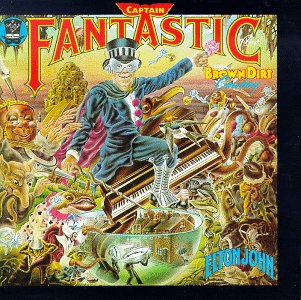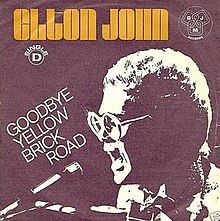
Bernard John Taupin is an English-American lyricist and visual artist. He is most well known for his songwriting partnership with Elton John, recognised as one of the most successful partnerships of its kind in history. Taupin is behind the majority of John's songs, dating back to the 1960s.

Goodbye Yellow Brick Road is the seventh studio album by English singer, pianist, and composer Elton John, first released on 5 October 1973 as a double album by DJM Records. The album has sold more than 20 million copies worldwide and is widely regarded as John's magnum opus. Among the 17 tracks, the album contains the hits "Candle in the Wind," US number-one single "Bennie and the Jets," "Goodbye Yellow Brick Road" and "Saturday Night's Alright for Fighting", along with the live favourite "Funeral for a Friend/Love Lies Bleeding."

Captain Fantastic and the Brown Dirt Cowboy is the ninth studio album by English musician Elton John. The album is an autobiographical account of the early musical careers of Elton John and his long-term lyricist Bernie Taupin. It was released in May 1975 by MCA Records in America and DJM in the UK and was an instant commercial success. The album was certified gold before its release, and reached No. 1 in its first week of release on the US Billboard 200, the first album to achieve both honours. It sold 1.4 million copies within four days of release, and stayed in the top position in the chart for seven weeks.

Greatest Hits is the eleventh official album release for English musician Elton John, and the first compilation. Released in November 1974, it spans the years 1970 to 1974, compiling ten of John's singles, with one track variation for releases in North America and for Europe and Australia. It topped the album chart in both the United States and the United Kingdom, staying at number one for ten consecutive weeks in the former nation and eleven weeks in the latter. In Canada, it was number one for 13 weeks between December 14, 1974, and March 22, 1975, missing only December 28, 1974, at number 2 to Jim Croce's Photographs & Memories.

"Tiny Dancer" is a song written by English musician and composer Elton John and lyricist Bernie Taupin, and performed by John. It was originally released on John's 1971 album Madman Across the Water, and was later produced and released as a single in 1972.

"Daniel" is a song written by English musician Elton John and his long-time songwriting partner Bernie Taupin, and performed by John. It was first released on John's 1973 album Don't Shoot Me I'm Only the Piano Player.

"Candle in the Wind" is a threnody written by English musician Elton John and songwriter Bernie Taupin, and performed by John. It was originally written in 1973, in honour of Marilyn Monroe, who had died 11 years earlier.

"Step into Christmas" is a Christmas song written by English musician Elton John and songwriter Bernie Taupin, and performed by John. It was released as a stand-alone single in November 1973 with the song "Ho, Ho, Ho " as the B-side. Upon its original 1973 release, the song peaked at No. 24 on the UK Singles Chart, and it reached a new peak of No. 8 on the same chart in 2019. In the United States, the single reached No. 56 on the Cash Box Top 100 Singles chart and No. 1 on the Billboard Christmas Singles chart.

"Your Song" is a song written by British musician Elton John and lyricist Bernie Taupin, and performed by John. It was John's first international Top 10 chart single.

"Crocodile Rock" is a song written by Elton John and Bernie Taupin, and recorded in summer 1972 at the Château d'Hérouville studio in France, where John and his team had previously recorded the Honky Château album. It was released on 27 October 1972 in the UK and 20 November 1972 in the U.S., as a pre-release single from his forthcoming 1973 album Don't Shoot Me I'm Only the Piano Player, and became his first U.S. number-one single, reaching the top spot on 3 February 1973, and staying there for three consecutive weeks. In the U.S., it was certified Gold on 5 February 1973 and Platinum on 13 September 1995 by the RIAA.

"Funeral for a Friend/Love Lies Bleeding" is a medley of two songs written by English musician Elton John and songwriter Bernie Taupin, and performed by John. It is the opening track of the 1973 double album Goodbye Yellow Brick Road.

"Levon" is a song written by English musician Elton John and songwriter Bernie Taupin, and performed by John. It was recorded on 27 February 1971, and was released on John's 1971 album, Madman Across the Water. Backing vocals are provided by Tony Burrows. Paul Buckmaster wrote the orchestral arrangements and directed the orchestra.

"Someone Saved My Life Tonight" is a song, with music by English musician Elton John and lyrics by Bernie Taupin, from John's 1975 album Captain Fantastic and the Brown Dirt Cowboy. It was released as a single on 23 June 1975, the only single released from the album. Like the rest of the album, the song is autobiographical, and addresses an attempted suicide by John.

"Saturday Night's Alright for Fighting" (sometimes written "Saturday Night's Alright (For Fighting)") is a song originally recorded by English musician Elton John. John composed it with his long-time songwriting partner Bernie Taupin. It was released on John's best-selling album Goodbye Yellow Brick Road (1973) and as the first single. It has been covered by many artists and featured on motion picture, video game, and television soundtracks.

"Philadelphia Freedom" is a song by English musician Elton John and songwriter Bernie Taupin. It was released as a single in 1975, credited to the Elton John Band. The song was the fourth of John's six number 1 US hits during the early and mid-1970s, which saw his recordings dominating the charts. In Canada it was his eighth single to hit the top of the RPM national singles chart.

"Island Girl" is a 1975 song by English musician Elton John. It was written by John and his songwriting collaborator Bernie Taupin and released as the first single from the album Rock of the Westies (1975). It reached number one for three weeks on the Billboard Hot 100 in the U.S., selling over one million copies, and also reached the top twenty in Canada, New Zealand, Australia and the UK.

"Bennie and the Jets" is a song written by English musician Elton John and songwriter Bernie Taupin, and performed by John. The song first appeared on the Goodbye Yellow Brick Road album in 1973. "Bennie and the Jets" has been one of John's most popular songs and was performed during his appearance at Live Aid.

The albums discography of British musician and singer-songwriter Elton John consists of 31 studio albums, 5 live albums, 10 soundtrack albums, 16 compilation albums, 4 extended plays, 3 tribute albums, 4 collaboration albums, and 2 holiday albums.

"Harmony" is a song written by English musician Elton John and songwriter Bernie Taupin, and performed by John. It is the final song on the 1973 double album Goodbye Yellow Brick Road. The song was recorded in May 1973, at Château d'Hérouville, France.

"Rocket Man" is a song written by English musician Elton John and songwriter Bernie Taupin and performed by John. It was originally released on 17 April 1972 in the US, as the lead single to John's album Honky Château. The song first charted in the UK on 22 April, rising to No. 2 in the UK Singles Chart and No. 6 in the US Billboard Hot 100, becoming a major hit single for John.


















